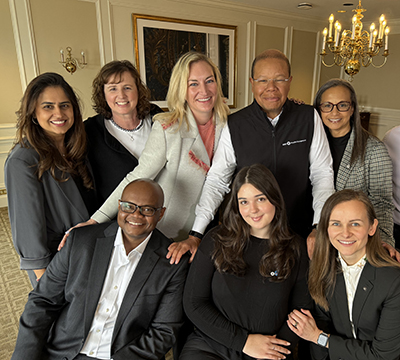Ujima—Learning about Black History and Black Lives
Black History Month is an opportunity for everyone in Canada and the U.S. to reflect on the Black experience through continuous learning and education. To fully understand the Black experience, we need to educate ourselves about the past that produced the present.
BMO has taken an important and bold step in that direction by making a unique course available to employees that goes deeper into the history and experience of Black people today. Ujima: An Introduction to the Black Experience is a rich guide to understanding how Black colleagues, customers, and communities experience life, and how past injustices continue to create disparity within the systems in which we live today.
Why now?
The global uprisings that occurred in the summer of 2020 have forced many to come to terms with the truth about decades of discrimination, and the harmful actions that are still occurring today. What is the legacy of racial injustice? Why is action needed now in Canada and the U.S.? These questions are highlighted throughout the course and provide insightful historical points and current events that assist the learner along the way. The creation of the Ujima course was a collaborative effort from several external diversity, inclusion, and Black cultural experts, as well as BMO Black and Latino Advisory Council and BMO’s Black Professional Network (BPN), who have thoughtfully contributed to this course.
Using the past to understand the present
Ujima comprises 14 modules divided into four chapters:
- Using the Past to Understand the Present;
- The Inequitable Gap in Wealth and Finance;
- How Racism and Bias Impact Black Experiences; and
- Our Collective Responsibilities—BMO’s Ujima.
The modules inevitably confront difficult truths, from the roots of the Black experience in North America in slavery, which was not abolished in the U.S. until 1865. Even after it was abolished, the active, systemic oppression of Black people continued. From the destruction of Black Wall Street in the Tulsa Race Massacre of 1921, to the bulldozing of Africville in Halifax in the 1960s, Black people have experienced ongoing denial of their basic political and economic rights.
Acknowledging the truth of our present
As Ujima notes, the effects of this oppression are still with us today. Black people account for 38% of all prison inmates in the United States, while representing only 13% of the overall population. In Canada, Black people experience higher unemployment and lower wages than their non-Black counterparts, with 33% of Black Canadians struggling to meet basic financial needs. And in both countries, Black households report significantly lower net worth than average.
We need to acknowledge this truth if we are to change it and remove barriers to inclusion and success. BMO has a significant role to play in achieving the goal of zero barriers, and that is the impetus behind Ujima. Bringing greater awareness to our employees about the history of racial injustice is an important step forward. As Ujima notes, financial institutions like BMO are especially important catalysts for equality, since unequal access to credit, capital and home ownership remains a major cause of the racial injustice that limits the ability of Black families and communities to flourish.
Achieving Zero Barriers to Inclusion
At BMO, we have made Zero Barriers to Inclusion for everyone—our staff, our customers, our communities—a cornerstone of our Purpose. Through BMO EMpower— our US$5billion commitment to underserved communities—and such employee groups as BMO BPN, we are giving concrete expression to that Purpose. And by developing Ujima and sharing it with our entire workforce, we are encouraging employees to dig deeper—into our shared history, and into potential blind spots that that history has produced in our own individual perspectives. We are confident that this initiative will help us as an organization to learn how to walk in the shoes of others. That journey is a long one, as anyone with an understanding of Black history will appreciate. But it is one to which we are fully committed, as we strive to Grow the Good—in business and life.








